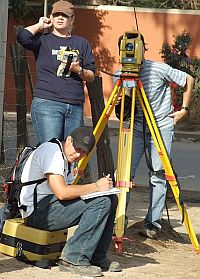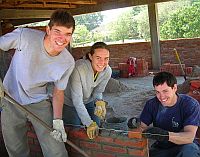
|
Course DesignSince 2000, Michigan Tech’s Civil and Environmental Engineering Department has administered ISD capstone design project classes for seniors, which allow students to obtain university credit for working on engineering projects in the developing world 2. ISD was created as a response to consistent student requests in a third-year professional practice course required by civil and environmental engineering majors. At that time, the professional practice course included a contract document preparation project for the developing world. Students completing the project frequently requested an opportunity to travel to the international project site and actually implement their ideas. Since the ISD program began students have successfully completed projects improving water supply, water resources/management; site master planning; site reclamation; solid waste management, and wastewater treatment to benefit communities. Currently, 20-25% of undergraduate civil and environmental engineering majors take this course. Ownership of the student design projects is so great that 18% of ISD alumni have returned for additional ISD in-country experiences as mentors and class assistants. ISD recognized the value of multidisciplinary and mentor involvement early in course development with incorporation after the first class delivery. In 2005, and continuing through the present, ISD “contracts” with other Michigan Tech Humanities courses by hiring classes and their student “employees” to produce brochures, grants, publications, and translations. ISD began as a single semester, 3-credit, major design experience that could also fulfill a technical elective requirement. In 2004, the course underwent revision to a 6-credit, two-course sequence. The credit change was precipitated after a review of the student hours required for completion of the experience and the ABET criterion students satisfied in each segment. In the first course, students spend two weeks in-country, during the first course, working on a construction site to learn local tools, materials, and techniques in addition to performing the design project needs assessment, client meetings and design data gathering. For teams, each day in-country involves actual construction labor and daily administration and management of the jobsite or gathering design data. Meetings are held with the “client,” mentors or other design professionals to gather additional data or information required to complete their respective design. During the “siesta” and in the evening, teams discuss observations and challenges or analyze progress and develop team plans for the following day. Team members may address issues in productivity assessment, materials management, construction progress forecasting, and investigate or discuss design feasibility or strategies in data gathering. Time is often spent making comparisons to traditional US industry practices. The engineering report includes the following: feasibility evaluation & assumptions; development and analysis of alternate design solutions; code analysis and review; discussion and analysis of potential design solutions including associated impact analysis, costs, economic and health factors, social impact, safety, constructability, sustainability, reliability, aesthetics, ethics; proposed construction schedule; engineering estimate, cost/benefit analysis; design calculations; and references (literature and personal). Students also complete construction contract documents as would be prepared by a design firm in industry: final construction drawings and a project manual including bid documents and specifications. Both ISD courses are structured to emulate the business of a design/build firm in industry, an environment the student will find themselves in within 6-12 months after the class experience. |
|
Last Modified on : August 1, 2015 Michigan
Technological University
|
For more info contact: 806 Dow Environmental Sciences and Engineering Building (906) 487-1640 email: |

